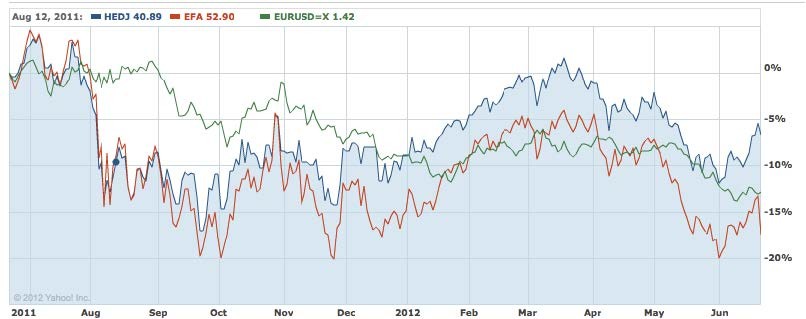A Dollar Hedged ETF Allocating Around the Falling Euro
Post on: 9 Май, 2015 No Comment

The end of 2009 saw the entry of a new ETF in the already dense ETF landscape; a currency hedged ETF. This new feature is of interesting significance due to its packaging inside an ETF.
Currency is a huge contributor to the total return of any international investment; so, naturally, falling foreign currency against the investors currency hurts its performance in the same way falling US Dollar benefits its return. For this reason, many investors have included foreign investments in their portfolio, recognizing its importance to the global economy.
Shown above is the iPath Euro/USD Exchange Rate ETN. This is an ETN that tracks the spot rates of the Euro/US Dollar exchanges, showing a short history of the two currencies. The Euro makes up 44% of the currency hedged by the WisdomTree International Hedged Equity (HEDJ). ETNs have no tracking error because of their structure.
As shown in the graph, the Euro has recently plunged against the Dollar similar to the way it did in the 4th quarter of 2008 when the Dollar was globally relied on as a safety currency during the September credit crisis. In the years before, the Euro steadily rose against the Dollar. This recent Euro downturn has been caused by Greece’s and other struggling Euro Countries economies under the Euro Currency, unlike in 2008.
The new ETF, issued by WisdomTree, is the first of its kind to hedge international currency risk in the ETF space. The fund, WisdomTree International Hedged Equity (HEDJ), is intended to invest in the WisdomTree DEFA index, which is tracked by the WisdomTree DEFA ETF (DWM) ; only HEDJ hedges the currency exposure of DWM. This means that investing in HEDJ is designed to be similar to investing in local markets with local currency. If an investor were to switch between the two funds, the expense ratio would not be prohibitive- a ten basis point difference. The newer WisdomTree International Hedged Equity ETF (HEDJ) is charging 0.58%, while the WisdomTree DEFA ETF (DWM) charges investors 0.48% annually. These expense ratios arent cheap by ETF standards, but both ETFs offer unique qualities not found elsewhere on the market, which may justify the cost.
How WisdomTree Delivers the Hedge
WisdomTree, as an ETF issuer, is a true innovator in the area of fundamental indexing and providing currency exposure inside of an ETF package, thus allowing the investor to avoid the ETN structure. To date, WisdomTree has a full line of currency income ETFs, including the WisdomTree Dreyfus Emerging Currency Fund (CEW). which tracks a basket of emerging market currencies.
The company has been able to provide this kind of exposure through its expertise in managing currency forward contracts. The WisdomTree International hedged Equity ETF (HEDJ) will hedge currencies by using the same kind of rolling forward contracts. The fund will replicate owning the index as if the investor were investing in the local markets.
Erasing Currency in Your International Investment
This ETF is interesting because the short-term movement of currencies is extremely volatile, making up a good deal of the volatility in the MCSI EAFE Index (an index benchmark for Europe, Australasia, and Far East)-a market cap weighted index in a similar space as the WisdomTree DEFA Index.
In the last 3 years, currency has added about 21% more variability than a local investment would have incurred over the same time period. Currencies also tend to trend against one another in a long-run generalized way. Until 2008, the Euro and many other developed currencies have gained against the US Dollar. With the problems in the Euros economies, the Euro has been floundering against the US Dollar. Investors with this viewpoint can use WisdomTree International Hedged Equity ETF (HEDJ) to stay invested in the international developed markets while dropping their currency exposure.
This strategy is sensible when investors like the long run growth potential of developed nations covered in the ETF, but would prefer not to see direct losses if the US Dollar strengthens.
Furthermore, the WisdomTree DEFA Fund, DWM, and WisdomTree International Hedged Equity (HEDJ) can be ‘twin’ ETFs, allowing investors to switch fluidly between them, exchanging currency risk (benefiting when the dollar falls) for a currency hedged fund (safeguarding against falling foreign currency).
Currency is often associated with national economic growth and regularly reflects the relative growth of national growth. This trend is what makes emerging market currencies attractive when the economies of those nations eventually develop.
A Fundamental Index
WisdomTree employs a fundamental indexing strategy in its equity ETFs. For the two ETFs discussed, this means a value-tilt to the funds. According to WisdomTree, this allows for better long run performance. Whether this is true or not, these two funds allow for access to unique investment qualities—the ability to hedge or not hedge the same equity stocks.














